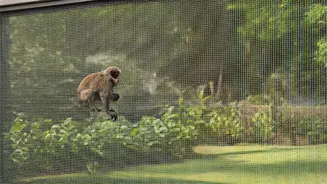Physical Barriers First
The initial defense against monkeys involves creating robust physical barriers. These creatures are agile and persistent, therefore, it is crucial to fortify
potential entry points. Start with windows and doors; ensure these are fitted with strong, properly secured mosquito netting. If you have a balcony or veranda, enclose it with sturdy wire mesh or a similar durable material, leaving no gaps that monkeys can exploit. For gardens, consider installing fencing that's at least six feet high, as monkeys are capable climbers. Make sure the fence is made of material that they cannot easily climb or damage. Prune trees that have branches near your house, since these can serve as convenient pathways for monkeys to reach your roof or balconies. These initial steps will significantly reduce the accessibility of your property to monkeys.
Food Storage Strategies
Monkeys are primarily attracted to your home by the scent of food, which makes proper storage essential. Never leave food items, including fruits, vegetables, or leftovers, exposed. Always store food in airtight containers, and make sure that these containers are kept inside your house or a secure pantry. Trash cans are another major attraction; ensure that all trash bins have tightly fitting lids and are placed away from easy access. Regularly empty your trash cans and dispose of the waste properly. Any pet food should also be stored securely and not left out in the open, as it can be an easy target for monkeys looking for a meal. By removing food sources, you will make your property much less appealing to these animals, reducing the frequency of their visits.
The Role of Cleanliness
Maintaining a clean environment around your house and garden is vital in keeping monkeys away. Regularly clean up any food debris, fallen fruits, or discarded snacks, as these can act as a magnet for monkeys. Ensure that any fruit trees in your garden are regularly harvested, as ripe and fallen fruits can attract them. Clean up any spills quickly, and make sure any compost bins are securely covered. Regularly sweep your veranda, balcony, and surrounding areas. The less available food and mess there is, the less reason monkeys will have to approach your home. Also, inspect your garden frequently for any signs of monkey activity and address them immediately to avoid a pattern of visits. Consistent cleanliness reinforces the message that your property is not a suitable place to find food.
Using Repellents Effectively
Various repellents can effectively deter monkeys, but it's important to choose ones that are safe and humane. Some effective options include using strong-smelling substances like chili powder or peppermint oil, which monkeys generally dislike. You can mix these with water and spray them around areas where monkeys are likely to enter, like windowsills, balconies, and garden pathways. Motion-activated sprinklers can also be a good deterrent, since they surprise the monkeys and discourage them from lingering. Consider using ultrasonic devices that emit sounds that monkeys find unpleasant, but are inaudible or harmless to humans. Always rotate the repellents you use, because monkeys may become accustomed to one type over time. Before using any repellent, make sure it's safe for both the environment and any pets or children who may come into contact with it.
Changing Monkey Behaviors
In addition to physical and chemical methods, you can also employ behavioral strategies to deter monkeys. Never feed monkeys, because this encourages them to associate humans with food, which will increase the likelihood of them returning. Instead, create an environment that discourages interaction and reinforces that your space is not a source of food. Make loud noises, such as clapping or shouting, to scare them away if they approach your property. Consider using decoys, such as statues of larger animals, which monkeys perceive as a threat and avoid. If monkeys are becoming a persistent nuisance, inform your local wildlife authorities or forest department. These agencies can sometimes offer assistance or guidance. By implementing a combination of these techniques, you can gradually modify the monkeys' behavior and reduce their visits to your home.





















